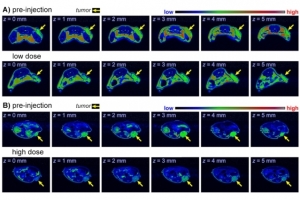by
Lauren Dubinsky, Senior Reporter | July 14, 2017

Gadolinium may become
a thing of the past
Researchers at MIT and the University of Nebraska have developed a metal-free MR contrast agent that could be a safer option for high-risk patients.
"This is an entirely organic, metal-free MRI contrast agent that would allow cancer researchers to start to think about how to image tumors in a dynamic way over long periods of time," Jeremiah Johnson, professor at MIT, said in a statement.
The most common MR contrast agents are based on the metal gadolinium, which cannot be used in patients with certain types of kidney problems.



Ad Statistics
Times Displayed: 46280
Times Visited: 1406 MIT labs, experts in Multi-Vendor component level repair of: MRI Coils, RF amplifiers, Gradient Amplifiers Contrast Media Injectors. System repairs, sub-assembly repairs, component level repairs, refurbish/calibrate. info@mitlabsusa.com/+1 (305) 470-8013
The agent has also been under scrutiny lately due to research that showed it is retained in the brain. As a result, there has been an increasing interest in developing alternatives.
Scientists have tried to create non-metal agents such as organic radicals, which are compounds with unpaired electrons. They are usually broken down in the bloodstream within minutes and they don't produce as much MR contrast as metal agents.
In a paper recently published in
ACS Central Science, Johnson and his colleagues described how they were able to manipulate the radicals into nitroxide brush-arm star polymer nanoparticles that can last in the bloodstream for up to 20 hours.
They demonstrated that it's a long enough time span to accumulate in a tumor in mice and that the nanoparticles are not harmful to mice even at very high doses.
Johnson envisions that these nanoparticles can be designed to carry drugs as well as an MR contrast agent. That would allow clinicians to monitor a tumor in the long term to determine if the drug is working.
He is also working with researchers at MIT's Koch Institute for Integrative Cancer Research to attach the contrast agent particles to antibodies that would help target specific cells for imaging and potentially, drug delivery.

